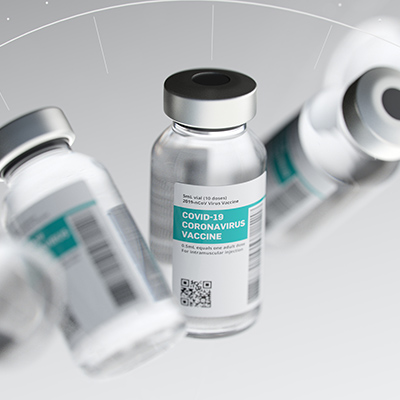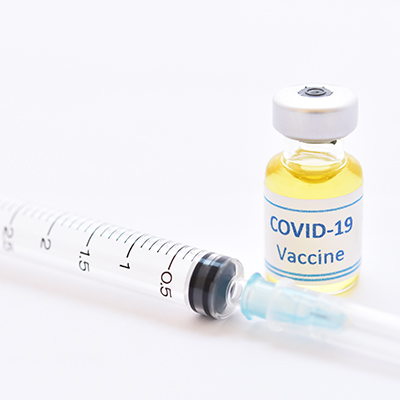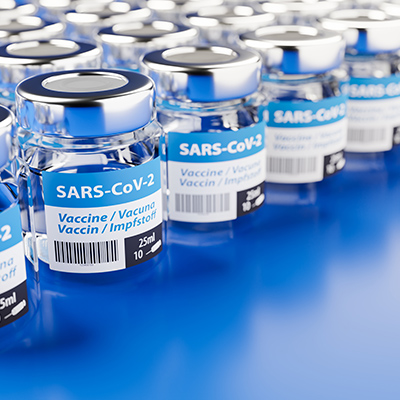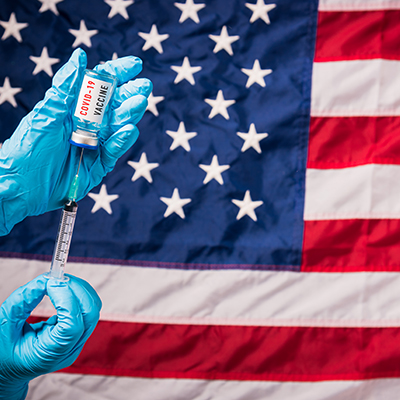February 18, 2021 -- With emergency authorizations for several COVID-19 vaccines under our belt, the question remains if these vaccines will be enough to carry us through the end of the pandemic. Experts agree that there will likely need to be additional vaccines to achieve full recovery. In this two-part series, we discuss what a next-generation COVID-19 vaccine might look like, and which candidates are in the running for authorizations.
One year after the first wave of the COVID-19 pandemic, vaccination programs are underway in an effort to return daily life to close to normal. Three COVID-19 vaccines have received emergency authorization in the U.S. and elsewhere, even as concerns grow over future waves of infection and variants of the SARS-CoV-2 virus.
Both the Pfizer-BioNTech vaccine and Moderna's offering harness novel messenger RNA (mRNA). Another vaccine, developed by the University of Oxford and AstraZeneca, employs a modified chimpanzee virus-adenovirus vector to deliver DNA for a component of SARS-CoV-2.
Recently, Johnson & Johnson requested emergency use authorization from the U.S. Food and Drug Administration (FDA) for its COVID-19 vaccine, which requires only a single dose, unlike the others, and does not require extreme cold-storage environments because it does not enlist delicate mRNA. Johnson & Johnson's is an adenovirus vector vaccine, using double-stranded DNA to generate an immune response.
But these vaccines won't put an end to the pandemic. So what can we expect from future vaccines? Will they be more effective and longer lasting? Will they truly be next-generational?

For Dr. Robert Gallo, who co-discovered that HIV was the cause of AIDS and developed the HIV blood test, for a new vaccine to be next-generational, it must take a different approach than using the SARS-CoV-2 virus's mRNA to tell the body's cells to produce the virus's distinctive spike protein. That protein triggers the immune system to produce an immune response against SARS-CoV-2.
"For me, next-generational will be vaccines that are proven to be broader -- better able to cover spike mutations, if we rely only on attacking the spike," said Gallo, co-founder and director of the Institute of Human Virology at the University of Maryland School of Medicine, and co-founder and scientific advisor of the Global Virus Network.
"So, next-generation (vaccines) might be still attacking the spike but with greater breadth and maybe greater duration, however that is achieved. Alternatively, a second-generation (vaccine) might be still attacking the spike, but with a broader and more potent T cellular response," he added.
Another protein to consider, Gallo indicated, is the nucleocapsid, which, like the spike protein, is a structural protein found in the virus. "I suggest it because it might add to the T cell immune response," he explained.
By no means is Gallo discounting current vaccine efforts. Moreover, he is impressed with mRNA technology.
"This is a new technology that is impressive because I wouldn't have thought that messenger RNA could survive. Still, mRNA is highly susceptible to degradation from enzymes. It's not a very protected molecule and has very little secondary structure," he says.
Gallo thinks that a live (attenuated) virus vaccine, like the oral polio vaccine (OPV), could be a stop gap option for a COVID-19 vaccine because it induces innate immunity.
"The good news is its breadth of coverage. It's not specific. It works against many virus infections," he noted.
Other nonspecific inducers of innate immunity -- other live attenuated viruses -- include the measles, mumps, and rubella vaccine, Gallo indicated.
"However, these have the severe weakness that they are very temporary, lasting likely but a few months," he noted. "Consequently, they are best viewed as a stop gap (measure) until a given problem is solved but are not a replacement of the much longer lasting specific vaccines. OPV would have been great if used at the onset of the pandemic and globally to break the pandemic."
Generally, Gallo sees certain issues regarding current COVID-19 vaccines:
- The cold chain: The vaccines must be kept at extreme refrigeration temperatures during transport, making deployment difficult.
- Short-term durability: How long will the vaccines be effective? Months? A year?
- There is a possible need to revaccinate people in less than a year.
- SARS-CoV-2 variants: What will be required to make vaccines more effective against certain variants?
There are 244 vaccine candidates in development, and in the second article of this series we will take a closer look at some of the candidates that are likely to succeed based on development and clinical evidence to date.
Do you have a unique perspective on your research related to vaccines or infectious diseases? Contact the editor today to learn more.
Copyright © 2021 scienceboard.net











